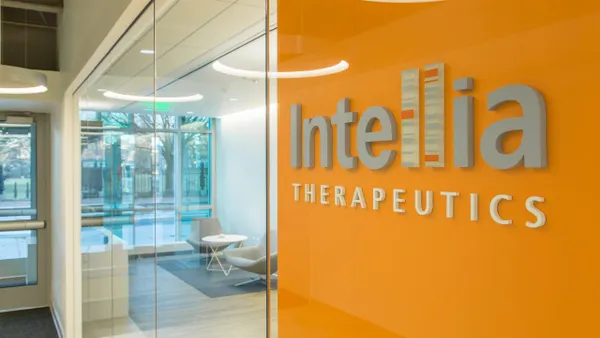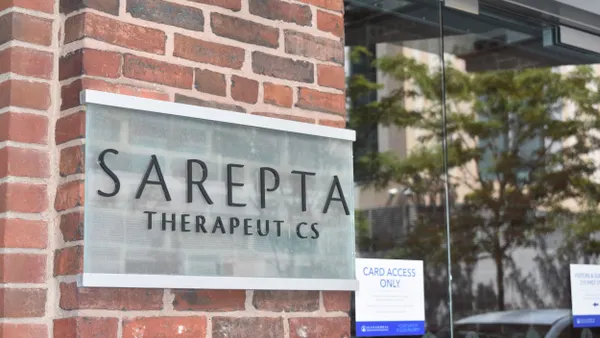Dive Brief:
- Eli Lilly’s popular diabetes drug Mounjaro proved about as effective as its older medicine Trulicity in protecting heart health in the largest and longest clinical trial of the newer GLP-1 therapy to date.
- According to summary results released by Lilly Thursday, Mounjaro met the main goal of the head-to-head study, which enrolled more than 13,000 people with Type 2 diabetes and heart disease and ran for nearly five years.
- While Mounjaro’s benefit wasn’t great enough for researchers to declare it superior to Trulicity, the rate of all-cause mortality was 16% lower for the newer drug, which in addition to stimulating the GLP-1 hormone receptor like Trulicity, also activates another known as GIP.
Dive Insight:
Tirzepatide, the active ingredient contained in Mounjaro and Zepbound, which Lilly sells for weight loss, has fast become one of the pharmaceutical industry’s fast-selling medicines. Already, it’s entrenched as a go-to option for treating Type 2 diabetes and obesity.
Studies like the one Lilly top-lined Thursday are meant to build on that dominance by proving out the tantalizing signals indicating tirzepatide can have powerful effects on a range of chronic illnesses. Already, Lilly has shown with Phase 3 trial data that tirzepatide can lower heart failure risk, ease obstructive sleep apnea and reduce the chances of developing diabetes.
The results released Thursday are particularly vital to Lilly’s plans, given the interplay between diabetes, obesity and heart risk. The company said it would share the data with regulators, potentially supporting its addition to Mounjaro’s labeling, which could help improve insurance coverage and encourage prescribing.
Called Surpass-CVOT, the trial pitted Mounjaro against Trulicity on an endpoint known as MACE-3, which tracks the time until first occurrence of either a stroke, heart attack or cardiovascular-related death. On that measure, data showed treatment with Mounjaro led to an 8% lower rate than did Trulicity, enough to statistically prove “non-inferiority” but not superiority.
“Although we would have rather seen tirzepatide demonstrate statistically significant superiority on the primary endpoint, we see the results as supportive of tirzepatide continuing to be preferred by physicians and patients over other GLP-1s, including Trulicity,” wrote Leerink Partners analyst David Risinger in a Thursday note to clients.
Other secondary measures also supported Mounjaro’s benefit. Clinical trial participants who received it on average experienced better kidney function and blood sugar control, although Lilly did not adjust the data for testing multiple hypotheses.
People on Mounjaro also experienced substantially greater improvements in weight, losing on average about 25 pounds at three years compared to about 10 pounds for those on Trulicity.
Lilly also compared data from Surpass-CVOT to an earlier study called Rewind that tested Trulicity against placebo and found the older GLP-1 drug reduced MACE-3 risk by about 12%. By statistically matching patients who received Mounjaro in Surpass-CVOT to those given placebo in Rewind, Lilly researchers estimated Mounjaro’s risk reduction versus placebo at 28% on MACE-3 and 39% on all-cause mortality.
Side effects were mainly gastrointestinal and generally ranged from mild to moderate in severity, Lilly said. However, slightly more participants on Mounjaro, about 13%, discontinued due to side effects than the roughly 10% in the group that received Trulicity.
Surpass-CVOT examined Mounjaro’s heart benefit in people who had diabetes; Lilly has another study, dubbed Surmount-MMO, that’s testing whether Zepbound can reduce broader morbidity and mortality risk in people with obesity and heart disease.
Success should help Lilly compete with Novo Nordisk’s competing GLP-1 drug semaglutide, which the Danish drugmaker sells as Ozempic for diabetes and Wegovy for weight loss. Novo already has proven Wegovy provides heart benefits in people with obesity, which has helped it secure favorable insurance coverage.
But Zepbound’s greater weight loss benefit appears to be winning out in the market, as Lilly has made gains against Novo. On Wednesday, Novo trimmed down its sales forecasts for the year, citing, among other things, increased competition.















